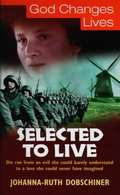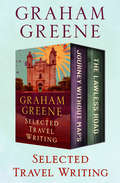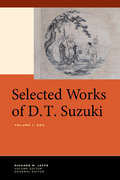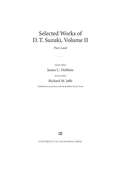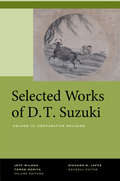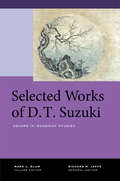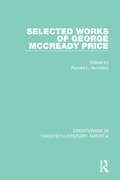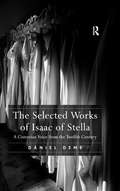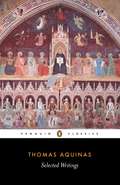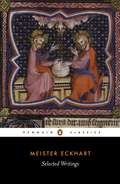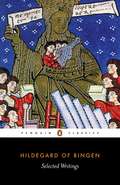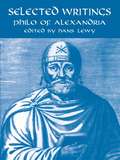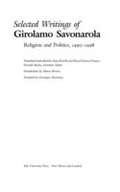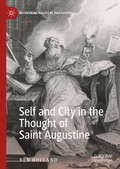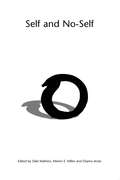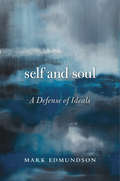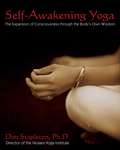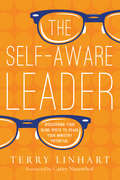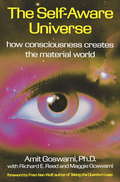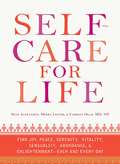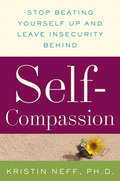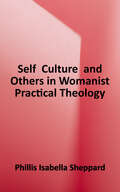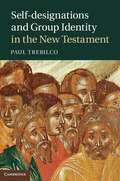- Table View
- List View
Selected to Serve
by Earl S. Johnson Jr.Earl S. Johnson, Jr. , has created an accessible, popularly written textbook for Presbyterian churches that covers all aspects of officer training--call, duties, ethics, the Presbyterian Constitution, and much more. Congregations will find this resource indispensable for the recruitment and training of effective church leaders.
Selected Travel Writing: Journey Without Maps and The Lawless Roads
by Graham GreeneA pair of revelatory travel memoirs from “a superb storyteller . . . [who] had a talent for depicting local color” (The New York Times). “One of the finest writers of any language,” British author Graham Greene embarked on two awe-inspiring and eye-opening journeys in the 1930s—to West Africa and to Mexico (The Washington Post). Greene would find himself both shaken and inspired by these trips, which would go on to inform his novels. Journey Without Maps: When Graham Greene set off from Liverpool in 1935 for what was then an Africa unmarked by colonization, it was to leave the known transgressions of his own civilization behind for those unknown. First by cargo ship, then by train and truck through Sierra Leone, and finally on foot, Greene embarked on a dangerous and unpredictable 350-mile, four-week trek through Liberia with his cousin and a handful of servants and bearers into a world where few had ever seen a white man. For Greene, this odyssey became as much a trip into the primitive interiors of the writer himself as it was a physical journey into a land foreign to his experience. “One of the best travel books [of the twentieth] century.” —The Independent The Lawless Roads: This eyewitness account of religious and political persecution in 1930s Mexico inspired The Power and the Glory, the British novelist’s “masterpiece” (John Updike). In 1938, Greene, a burgeoning convert to Roman Catholicism, was commissioned to expose the anticlerical purges in Mexico. Churches had been destroyed, peasants held secret masses in their homes, religious icons were banned, and priests disappeared. Traveling under the growing clouds of fascism, Greene was anxious to see for himself the effect it had on the people. Journeying through the rugged and remote terrain of Chiapas and Tabasco, Greene’s emotional, gut response to the landscape; the sights and sounds; the oppressive heat; and the people’s fear, despair, resignation, and fierce resilience makes for a vivid and powerful chronicle. “[A] singularly beautiful travel book.” —New Statesman
Selected Works of D.T. Suzuki, Volume I
by Daisetsu Teitaro SuzukiDaisetsu Teitaro Suzuki was a key figure in the introduction of Buddhism to the non-Asian world. Many outside of Japan encountered Buddhism for the first time through his writings and teaching, and for nearly a century his work and legacy have contributed to the ongoing religious and cultural interchange between Japan and the rest of the world, particularly the United States and Europe. Selected Works of D. T. Suzuki gathers the full range of Suzuki's writings--both classic essays and lesser-known but equally significant articles. This first volume in the series presents a collection of Suzuki's writings on Zen Buddhist thought and practice. In an effort to ensure the continued relevance of Zen, Suzuki drew on his years of study and practice, placing the tradition into conversation with key trends in nineteenth- and twentieth-century thought. Richard M. Jaffe's in-depth introduction situates Suzuki's approach to Zen in the context of modern developments in religious thought, practice, and scholarship. The romanization of Buddhist names and technical terms has been updated, and Chinese and Japanese characters, which were removed from many post-World War II editions of Suzuki's work, have been reinstated. This will be a valuable edition of Suzuki's writings for contemporary scholars and students of Buddhism.
Selected Works of D. T. Suzuki, Volume II: Pure Land
by Richard M. Jaffe James C. DobbinsDaisetsu Teitaro Suzuki was a key figure in the introduction of Buddhism to the non-Asian world. Many outside Japan encountered Buddhism for the first time through his writings and teaching, and for nearly a century his work and legacy have contributed to the ongoing religious and cultural interchange between Japan and the rest of the world, particularly the United States and Europe. This second volume of Selected Works of D. T. Suzuki brings together Suzuki's writings on Pure Land Buddhism. At the center of the Pure Land tradition is the Buddha Amida and his miraculous realm known as paradise or "the land of bliss," where sentient beings should aspire to be born in their next life and where liberation and enlightenment are assured. Suzuki, by highlighting certain themes in Pure Land Buddhism and deemphasizing others, shifted its focus from a future, otherworldly goal to religious experience in the present, wherein one realizes the nonduality between the Buddha and oneself and between paradise and this world. An introduction by James C. Dobbins analyzes Suzuki's cogent, distinctive, and thought-provoking interpretations, which helped stimulate new understandings of Pure Land Buddhism quite different from traditional doctrine.
Selected Works of D.T. Suzuki, Volume III: Comparative Religion
by Daisetsu Teitaro SuzukiDaisetsu Teitaro Suzuki was a key figure in the introduction of Buddhism to the non-Asian world. Many outside Japan encountered Buddhism for the first time through his writings and teaching, and for nearly a century his work and legacy have contributed to the ongoing religious and cultural interchange between Japan and the rest of the world, particularly the United States and Europe. This third volume of Selected Works of D. T. Suzuki brings together a diverse collection of Suzuki's letters, essays, and lectures about non-Buddhist religions and his thoughts on their relation to Buddhism, as well as his reflections on the nature of religion itself. Some of these writings have been translated into English for the first time in this volume. As a long-term resident of the United States, a world traveler, and a voracious consumer of information about all forms of religion, Suzuki was one of the foremost Japanese mediators of Eastern and Western religious cultures for nearly seven decades. An introduction by Jeff Wilson and Tomoe Moriya analyzes Suzuki's frequent encounters with texts and practitioners of many religions, considers how events in Suzuki's lifetime affected his interpretations of Christianity, Shinto, and other traditions, and demonstrates that his legacy as a scholar extends well beyond Buddhism.
Selected Works of D.T. Suzuki, Volume IV: Buddhist Studies
by Daisetsu Teitaro SuzukiDaisetsu Teitar?¯ Suzuki was a key figure in the introduction of Buddhism to the non-Asian world. Many outside Japan encountered Buddhism for the first time through his writings and teaching, and for nearly a century his work and legacy have contributed to the ongoing religious and cultural interchange between Japan and the rest of the world, particularly the United States and Europe. This fourth volume of Selected Works of D. T. Suzuki brings together a range of Suzuki’s writings in the area of Buddhist studies. Based on his text-critical work in the Chinese canon, these essays reflect his commitment to clarifying Mahayana Buddhist doctrines in Indian, Chinese, and Japanese historical contexts. Many of these innovative writings reflect Buddhological discourse in contemporary Japan and the West’s pre-war ignorance of Mahayana thought. Included is a translation into English for the first time of his "Mahayana Was Not Preached by Buddha." In addition to editing the essays and contributing the translation, Mark L. Blum presents an introduction that examines how Suzuki understood Mahayana discourse via Chinese sources and analyzes his problematic use of Sanskrit.
Selected Works of George McCready Price
by Ronald L. NumbersOriginally published in 1995, The Selected Works of George McCready Price is the seventh volume in the series, Creationism in Twentieth Century America, reissued in 2021. The volume brings together the original writings and pamphlets of George McCready Price, a leading creationist of the early antievolution crusade of the 1920s. McCready Price labelled himself the ‘principal scientific authority of the Fundamentalists’ and as a self-taught scientist he enjoyed more scientific repute amongst fundamentalists of the time. This interesting and unique collection of original source material includes five of his writings between 1906 and 1924, challenging the new Darwinian theory of evolution and natural selection through his writings on the natural sciences. His literature covers the topics of evolution and biology and critiques biological arguments for evolution. He also wrote widely on geology offering his own alternative argument of ‘flood geography’ in opposition to the Darwinian theory concerning palaeontology and geology. This volume will be of interest to historians of natural history and the creationism movement, as well as scholars of religion and American history.
The Selected Works of Isaac of Stella: A Cistercian Voice from the Twelfth Century
by Daniel DemeThis book presents an invaluable selection of sermons and theological treatises of the twelfth century author, Isaac of Stella. The English born abbot of the French Cistercian monastery of Stella on the Isle of Ré is one of the most inspiring, yet equally elusive, representatives of the great twelfth-century Cistercian Renaissance more widely associated with the person of Bernard of Clairvaux. The astonishing spiritual and intellectual depth of Isaac's surviving writings makes him a valuable read for anyone aiming to receive a complete picture of the intellectual heritage of the Middle Ages. Of the twenty-five sermons by Isaac presented in this volume, ten are made available here in an English translation for the first time. These are accompanied with two new studies examining Isaac of Stella's work from an historical, literary as well as theological perspective.
Selected Writings (World's Classics Ser.)
by Thomas AquinasIn his reflections on Christianity, Saint Thomas Aquinas forged a unique synthesis of ancient philosophy and medieval theology. Preoccupied with the relationship between faith and reason, he was influenced both by Aristotle's rational world view and by the powerful belief that wisdom and truth can ultimately only be reached through divine revelation. Thomas's writings, which contain highly influential statements of fundamental Christian doctrine, as well as observations on topics as diverse as political science, anti-Semitism and heresy, demonstrate the great range of his intellect and place him firmly among the greatest medieval philosophers.
Selected Writings
by Meister EckhartComposed during a critical time in the evolution of European intellectual life, the works of Meister Eckhart (c. 1260-1327) are some of the most powerful medieval attempts to achieve a synthesis between ancient Greek thought and the Christian faith. Writing with great rhetorical brilliance, Eckhart combines the neoplatonic concept of oneness - the idea that the ultimate principle of the universe is single and undivided - with his Christian belief in the Trinity, and considers the struggle to describe a perfect God through the imperfect medium of language. Fusing philosophy and religion with vivid originality and metaphysical passion, these works have intrigued and inspired philosophers and theologians from Hegel to Heidegger and beyond.
Selected Writings
by Hildegard of BingenBenedictine nun, poet and musician, Hildegard of Bingen (1098-1179) was one of the most remarkable figures of the Middle Ages. She undertook preaching tours throughout the German empire at the age of sixty, and was consulted not only by her religious contemporaries but also by kings and emperors, yet it is largely for her apocalyptic and mystical writings that she is remembered. This volume includes selections from her three visionary works, her treatises on medicine and the natural world, her devotional songs, and fascinating letters to prominent figures of her time. Dealing with such eternal subjects as the relationship between humans and nature, and men and women, Hildegard's works show her to be a wide-ranging thinker who created such fresh, startling images and ideas that her writings have been compared to Dante and Blake.
Selected Writings
by Philo Hans LewyThese selections illuminate Philo's crucial role in assimilating Greek philosophy to biblical religion and accommodating Jewish belief to Greek thought. Topics include the knowledge of God; the mystic way; the soul and her God; man's humility, hope, faith, and joy; vices and virtues; and Israel and the nations.
Selected Writings of Girolamo Savonarola: Religion and Politics, 1490-1498
by Girolamo Savonarola Anne Borelli Maria Pastore PassaroFive hundred years after his death at the stake, Girolamo Savonarola remains one of the most fascinating figures of the Italian Renaissance. This wide-ranging collection, with an introduction by historian Alison Brown, includes translations of his sermons and treatises on pastoral ministry, prophecy, politics, and moral reform, as well as the correspondence with Alexander VI that led to Savonarola's silencing and excommunication. Also included are first-hand accounts of religio-civic festivities instigated by Savonarola and of his last moments. This collection demonstrates the remarkable extent of Savonarola's contributions to the religious, political, and aesthetic debates of the late fifteenth century.
Self and City in the Thought of Saint Augustine (Recovering Political Philosophy)
by Ben HollandSelf and City in the Thought of Saint Augustine explores the analogy between the self and political society in the thought of St. Augustine of Hippo. This analogy is an important theme in the history of political thought. Attempts have been made to understand the state by examining the soul (since Plato), the body (as in medieval theories of the body politic) and the person (surviving to this day in such concepts as international legal personality). This book aims to reinstate the Augustinian part of the story. It argues that Augustine develops three analogies between self and city, as a society ordered by love: self-love in the case of the Earthly City; divided but improving love in the Pilgrim City; and love of others and of God in the City of God. It supplies thereby an overview of Augustine’s intellectual ‘system’ as it touches upon theology, psychology and anthropology, as well as politics, and also provides a new interpretation of Augustine’s important definition of the republic.
Self and No-Self: Continuing the Dialogue Between Buddhism and Psychotherapy
by Dale Mathers Melvin E. Miller Osamu AndoThis collection explores the growing interface between Eastern and Western concepts of what it is to be human from analytical psychology, psychoanalytic and Buddhist perspectives. The relationship between these different approaches has been discussed for decades, with each discipline inviting its followers to explore the depths of the psyche and confront the sometimes difficult psychological experiences that can emerge during any in-depth exploration of mental processes. Self and No-Self considers topics discussed at the Self and No-Self conference in Kyoto, Japan in 2006. International experts from practical and theoretical backgrounds compare and contrast Buddhist and psychological traditions, providing a fresh insight on the relationship between the two. Areas covered include: the concept of self Buddhist theory and practice psychotherapeutic theory and practice mysticism and spirituality myth and fairy tale. This book explains how a Buddhist approach can be integrated into the clinical setting and will interest seasoned practitioners and theoreticians from analytical psychology, psychoanalytic and Buddhist backgrounds, as well as novices in these fields.
Self and Soul: A Defense of Ideals
by Mark EdmundsonIn a culture that has become progressively more skeptical and materialistic, the desires of the individual self stand supreme, Mark Edmundson says. We spare little thought for the great ideals that once gave life meaning and worth. Self and Soul is an impassioned effort to defend the values of the Soul. Edmundson guides readers back to the ancient sources of the three great ideals: courage, contemplation, and compassion. Homerâe(tm)s Iliad presents two contrasting versions of the heroic ideal: Achilles, who risks everything to become the greatest of warriors, and Hector, who sacrifices his life to defend his people. Platoâe(tm)s quest is for timeless truth: he is the prime example of the authentic thinker, concentrating the ideal of contemplation. The third great ideal, compassion, is embodied by Jesus, the Buddha, and Confucius, who taught loving kindness, forgiveness, and forbearance in a world where such qualities are difficult and sometimes dangerous to espouse. Shakespeare and Freud are the modern worldâe(tm)s great enemies of these ideals, Edmundson argues. Shakespeare detests chivalry and has little time for faith and philosophy. Freud sees ideals as illusions that will inevitably betray us. But between them, a new ideal arises: imaginative creation, exemplified by Blake and Shelley. Self and Soul is, as Edmundson provocatively writes, an attempt to resurrect Soul in the modern world.
Self-Awakening Yoga: The Expansion of Consciousness through the Body's Own Wisdom
by Don StapletonTakes yoga back to its roots as a creative learning process and an expansion of consciousness, not just a technique for health and fitness • Provides simple techniques that enhance the free flow of prana to promote physical and emotional healing, self-discovery, and spiritual evolution • Includes over 100 exercises and meditations for a self-structured practice • Teaches how to release the body’s inefficient, painful patterns and to access unknown potentials through kinesthetic inquiries When artist and professor Don Stapleton discovered yoga, it marked the beginning of a journey into the awakening powers of prana--the energy of yogic purification--and the natural spiritual and healing properties of his own body. After 30 years of extensive yoga training, an accident left him with a severe injury to the spine. Faced with the challenge of physical recovery, Stapleton drew upon his knowledge of yoga to create a series of exercises that allowed him to recover freedom of movement, release emotional blockages, and unleash his spiritual and physical potential. Self-Awakening Yoga is the synthesis of Stapleton’s practice. More than 100 exercises--from focusing on the breath to accessing primal sound--show how to unlock the wisdom and power of prana to engage the body’s healing powers. His simple exercises and meditations focus on natural movements that encourage body awareness. Readers learn how to listen to what the body is saying before engaging in any specific yoga postures. Self-Awakening Yoga takes yoga back to its roots as a creative learning process and an expansion of consciousness, not just a technique for health and fitness.
The Self-Aware Leader: Discovering Your Blind Spots to Reach Your Ministry Potential
by Terry Linhart2018 Top Ten Books For Parish Ministry Effective ministry begins here. You've studied what you think you need to know before entering a career in ministry. Is there anything that is more important than knowing about hermeneutics, homiletics, theology, exegesis, and everything else you have likely learned in seminary and church ministry so far? Yes, there is. How well do you know yourself? You need to build your ministry career on the right foundation of an objective understanding of self. If you don't comprehend your strengths and weaknesses, then you won't be fully prepared to enter the crucible of ministry. Serving as a pastor is one of the toughest calls there is. But it can also be one of the most fulfilling and rewarding, especially if you have taken the time to examine both your gifts and vulnerabilities. The church needs leaders who have the clear-eyed courage to pursue the hardest part of the ministry journey: seeing yourself. The Self-Aware Leader will help you to do just that.
The Self-Aware Universe
by Amit GoswamiConsciousness, not matter, is the ground of all existence, declares University of Oregon physicist Goswami, echoing the mystic sages of his native India. He holds that the universe is self-aware, and that consciousness creates the physical world.
Self-Awareness in Islamic Philosophy
by Jari KaukuaThis important book investigates the emergence and development of a distinct concept of self-awareness in post-classical, pre-modern Islamic philosophy. Jari Kaukua presents the first extended analysis of Avicenna's arguments on self-awareness - including the flying man, the argument from the unity of experience, the argument against reflection models of self-awareness, and the argument from personal identity - arguing that all these arguments hinge on a clearly definable concept of self-awareness as pure first-personality. He substantiates his interpretation with an analysis of Suhrawardī's use of Avicenna's concept and Mullā Sadrā's revision of the underlying concept of selfhood. The study explores evidence for a sustained, pre-modern and non-Western discussion of selfhood and self-awareness, challenging the idea that these concepts are distinctly modern, European concerns. The book will be of interest to a range of readers in history of philosophy, history of ideas, Islamic studies, and philosophy of mind.
Self Care for Life
by Skye Alexander Meera Lester Carolyn DeanThe best way to take care of your self is to take care of your Self. With its unique three-fold approach, this book helps you nurture and nourish the mind, body, and spirit within the natural course of every day: Mind Take a break from the (bad) news. It's hard to find spiritual sustenance and renewal in a world rocked by tension. So turn off the television and radio, stay off the Internet, and stop the daylong bombardment of negativity from virtually every media outlet. Body Drink a cup of gyokuro tea. Theanine is an amino acid that increases alpha brainwave activity--and gyokuro tea is chock full of it. One cup of this Japanese green tea and you'll be calmer and wiser for up to four hours. Spirit Choose a natural talisman. A talisman is a token chosen to create a certain effect. Crystals, stones, and feathers are natural talismans you can use to protect yourself from anxiety, relieve stress, and remind you who you really are. From alternative medicine and ayurvedic nutrition to chakra healing and tantric sex, this book allows you to weave self-care into the weft and woof of your lives, transforming your lives--moment to moment, hour to hour, day to day.
Self-Compassion: The Proven Power of Being Kind to Yourself (The\instant Help Solutions Ser.)
by Dr. Kristin NeffKristin Neff, Ph.D., says that it’s time to “stop beating yourself up and leave insecurity behind.” Self-Compassion: Stop Beating Yourself Up and Leave Insecurity Behind offers expert advice on how to limit self-criticism and offset its negative effects, enabling you to achieve your highest potential and a more contented, fulfilled life.More and more, psychologists are turning away from an emphasis on self-esteem and moving toward self-compassion in the treatment of their patients—and Dr. Neff’s extraordinary book offers exercises and action plans for dealing with every emotionally debilitating struggle, be it parenting, weight loss, or any of the numerous trials of everyday living.
Self, Culture, and Others in Womanist Practical Theology (Black Religion/womanist Thought/social Justice Ser.)
by Phillis Isabella SheppardTo illustrate the complexities of black women's experiences of self-identification and racial embodiment, the author provides an account that engages both psychoanalytic theory and the role of religion and cultural objects in self-understanding.
Self-designations and Group Identity in the New Testament
by Paul TrebilcoWhat terms would early Christians have used to address one another? In the first book-length study on this topic, Paul Trebilco investigates the origin, use and function of seven key self-designations: 'brothers and sisters', 'believers', 'saints', 'the assembly', 'disciples', 'the Way', and 'Christian'. In doing so, he discovers what they reveal about the identity, self-understanding and character of the early Christian movement. This study sheds light on the theology of particular New Testament authors and on the relationship of early Christian authors and communities to the Old Testament and to the wider context of the Greco-Roman world. Trebilco's writing is informed by other work in the area of sociolinguistics on the development of self-designations and labels and provides a fascinating insight into this often neglected topic.
